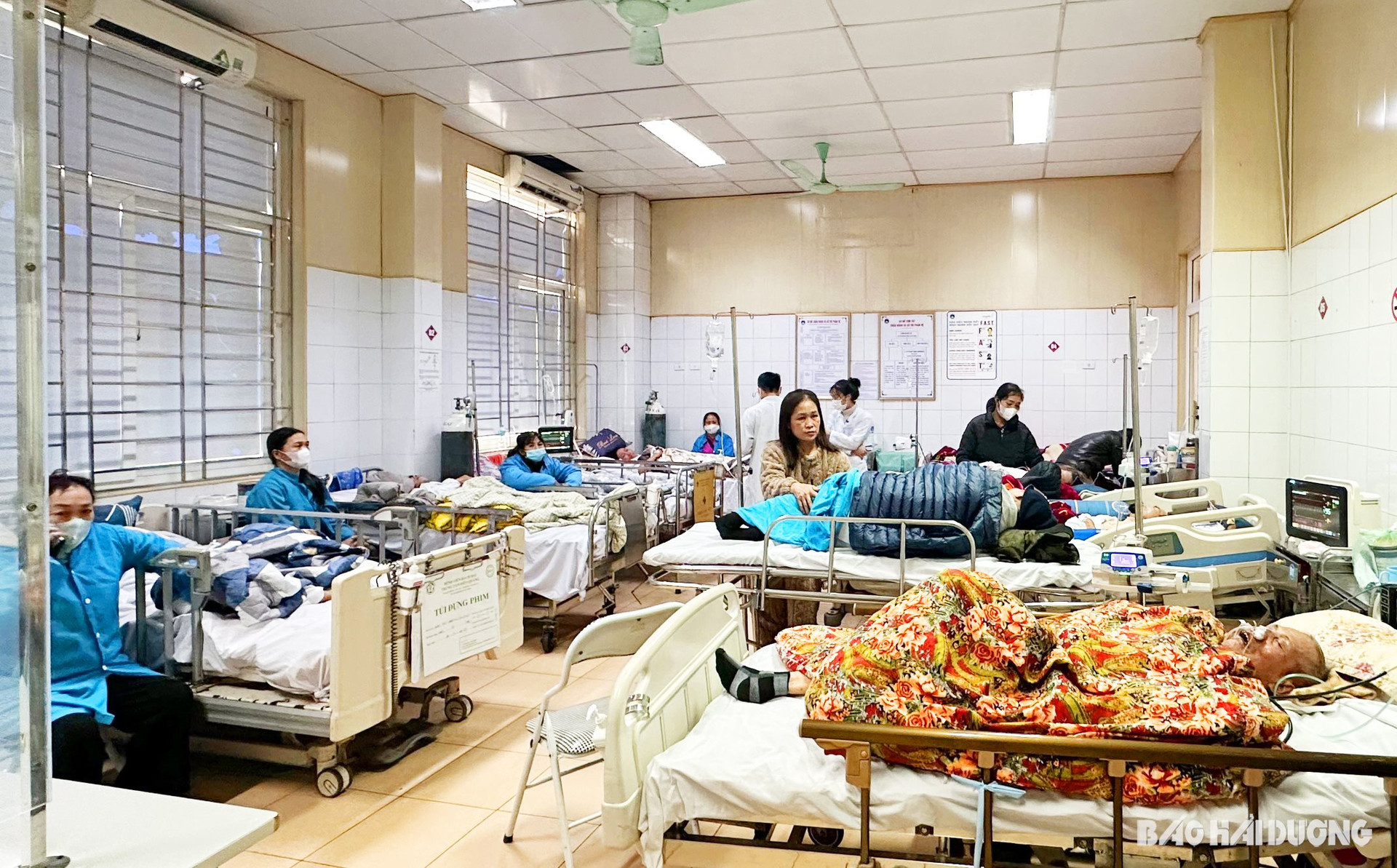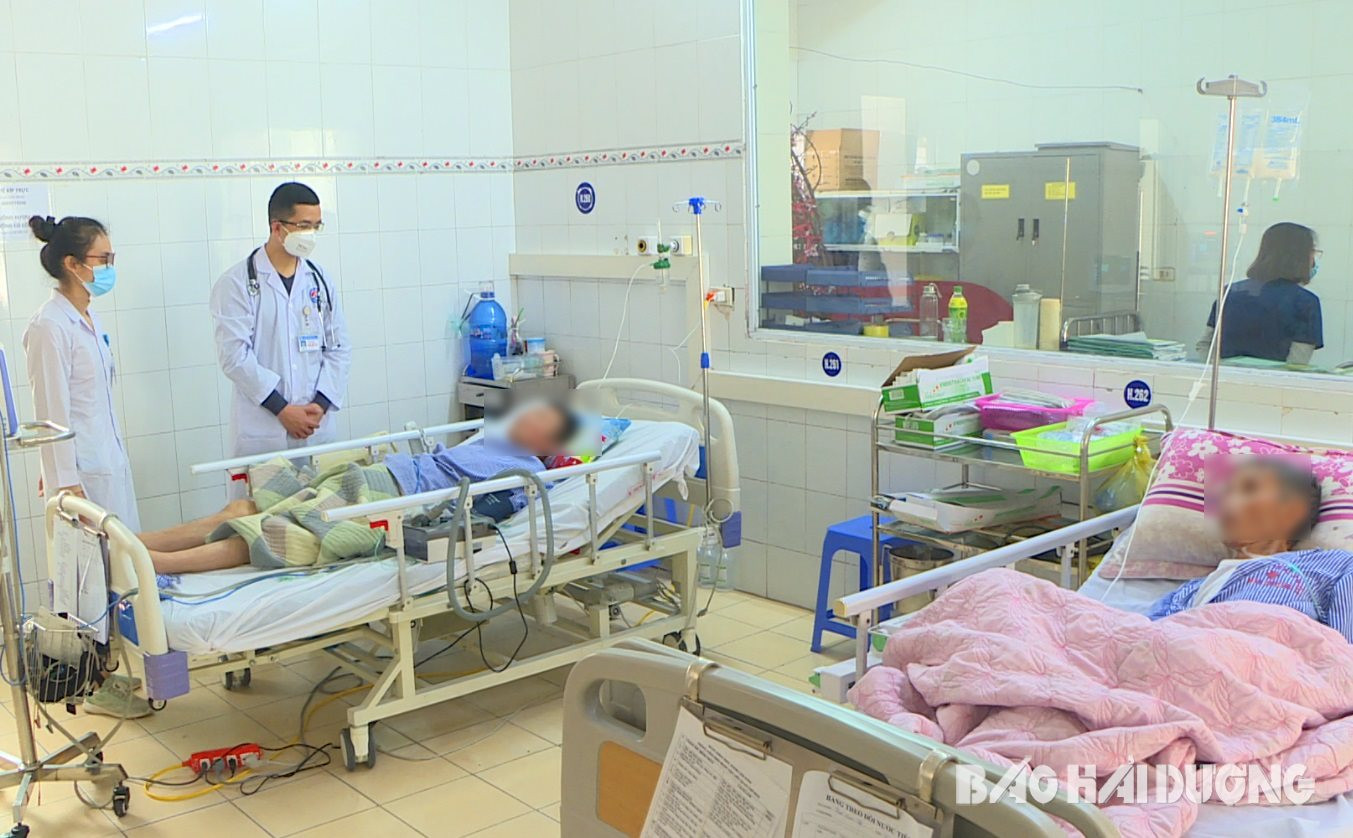Due to the impact of the first cold spell of the year, the number of patients hospitalized at treatment facilities in Hai Duong is increasing.

Most of the emergency beds in the provincial hospitals are overloaded. Emergency patients are mainly due to cardiovascular and respiratory diseases and many have suffered from strokes.
The Stroke Department of Hai Duong General Hospital is overloaded with 54 patients. On previous sunny days, the department only had 20-25 patients. Master, Doctor Mac Doanh Thinh, Head of the Stroke Department, said: The weather has turned cold, the number of stroke patients has increased dramatically. On December 17 alone, 14 stroke patients were admitted to the emergency room. Most of the patients were over 60 years old, the youngest stroke patient was 40 years old. Of these, more than 30% had brain hemorrhages due to uncontrolled high blood pressure. Due to the large number of patients admitted to the hospital, all the hospital beds in the department were full, and the department had to add more stretchers for the patients to lie on.
The Cardiovascular Center of the Provincial General Hospital is also treating nearly 90 patients, most of whom are elderly. Dr. Ha Quang Tao, Director of the Center, said: The sudden cold weather has caused an increase in patients with cardiovascular diseases coming for examination and hospitalization. At the hospital's initial clinic, when the weather turns cold, more than 200 people come for examination each day, an increase of more than 30% compared to previous days. The Center is currently treating nearly 50 patients. Among the elderly patients hospitalized for cardiovascular disease and stroke, some cases have serious complications.
Along with the increase in the number of patients with cardiovascular diseases and strokes hospitalized, the number of elderly patients and children with respiratory diseases at medical facilities has increased. The Respiratory Department of Hai Duong Children's Hospital is treating over 90 children with respiratory diseases on December 17. The number of patients with influenza A being treated at the Infectious Diseases Department of this hospital has also increased significantly.
Hai Duong Lung Hospital is also overloaded with patients, especially in the Emergency Department. Every cold day, more than 10 patients are admitted to the emergency room with respiratory failure. The hospital is admitting and treating nearly 400 patients, a significant increase compared to warm, sunny days. The reason for the increase in hospital admissions is that the weather has changed from hot to cold, so the number of people with respiratory and lung diseases has increased, especially patients with chronic obstructive pulmonary disease. The treatment departments at Hai Duong Lung Hospital are all very crowded with patients, and due to the increase in seriously ill patients, there is a risk of a shortage of emergency beds.
One of the causes of serious illness in the elderly is the increase in the number of patients with influenza A in recent days. The elderly have weak resistance, especially those with respiratory diseases such as asthma, pneumonia, bronchitis... when infected with influenza, the disease will be severe, even respiratory failure.

Medical facilities have also increased measures to protect patients from the cold. All clinics have curtains and canvas to prevent drafts. Rooms are closed, and additional heating systems are installed for elderly patients, emergency patients, and patients with serious conditions.
The health sector recommends that people keep their bodies warm when it is cold, especially the elderly, children or people with a history of cardiovascular diseases such as high blood pressure, diabetes, coronary artery disease, respiratory diseases. Avoid going out in cold weather suddenly in the morning, especially when you first wake up or late at night when the outside temperature drops. When going out, wear a mask, absolutely do not heat with coal or firewood and keep the doors closed. When bathing, warm the room with a heating lamp and use warm water to avoid sudden increases in blood pressure due to cold.
For the elderly, when there is a hypertensive crisis, blood pressure should not be reduced too quickly, as it is very dangerous because the response of blood vessels in the elderly is not good. If blood pressure is reduced too quickly, the body will not be able to adapt and symptoms of dizziness, headache, and nausea will appear.
Patients with high blood pressure should take blood pressure lowering drugs as prescribed by their doctor. Blood pressure medications should be taken continuously, for life, and should not be stopped suddenly and should be monitored by medical staff... Follow a healthy diet, adequate nutrition, get enough sleep, exercise properly, get vaccinated against flu and other infectious diseases...
DUC THANH